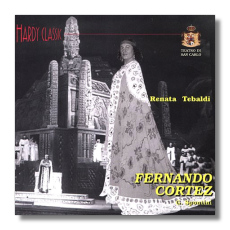
The Internet's Premier Classical Music Source
Related Links
- Latest Reviews
- More Reviews
-
By Composer
-
Collections
DVD & Blu-ray
Books
Concert Reviews
Articles/Interviews
Software
Audio
Search Amazon
Recommended Links
Site News
 CD Review
CD Review
Gaspare Spontini

Fernando Cortez
- Fernando Cortez: Gino Penno, tenor
- Amazily: Renata Tebaldi, soprano
- Alvaro: Piero de Palma, tenor
- Telasco: Aldo Protti, baritone
- High Priest: Antonio Cassinelli, bass
- Montezuma: Italo Tajo, bass
- Morales: Afro Poli, baritone
San Carlo Theater Chorus and Orchestra/Gabriele Santini
Hardy Classic 6008 Recorded in 1951 2CDs
1950 was an important year in the developing career of Renata Tebaldi, when she sang a number of important roles for the first time: Rossini's Stabat Mater, Verdi's Aïda, Spontini's Olympia, Bach's St. Matthew Passion, Mozart's Requiem (with Toscanini), and Handel's Giulio Cesare. In the following year, she sang in a Naples production of an Italian version of Spontini's Hernando Cortez, its first performance in the 20th century, and that is what is restored to us on these two discs.
The Italian-born Spontini (1774-1851) was Napoleon's favorite composer, and it is said that he suggested the subject of this opera, even assigning the poet and police spy Esmenard to collaborate with Etienne de Jouy to make certain the libretto emphasized the parallel between Cortez's conquest of Mexico and the Emperor's planned invasion of Spain. The plot ignores historical reality; Cortez and his conquistadors are presented as noble heroes, Montezuma as a magnanimous king who releases his Spanish prisoners upon the intercession of the Aztec princess Amazily, who is in love with Cortez. premièred at the Paris Opéra in 1809, it was not well received, and was substantially revised before being reintroduced in 1817, after which it stayed in the repertory in France and Germany for a considerable time. Spontini's music has its roots in Gluck but is considerably more dramatic and passionate, and this opera in particular is full the kind of spectacular stage effects that Meyerbeer's grand operas were to exploit more fully. There are only a couple of memorable arias, but it is dominated by very effective (if not particularly imaginative) writing for ensembles, chorus, and orchestra.
Tebaldi's voice is a bit edgy in this production, though she produced some lovely singing in the lyrical passages. The rest of the cast is excellent (especially Penno as Cortez), all veterans of Italian opera with well-produced, strong, clear, and expressive voices. Santini leads briskly and secures committed performances from everyone involved. The sound is poor, but it's the only available recording of this rarely-heard and interesting opera, and enough of the music and singing comes through to make it worth your attention.
Copyright © 2000, Alexander J. Morin


















